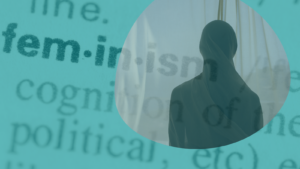Gender equality – a social dilemma?
This year, Australia fell from holding 15th place down to ranking 44th on the World Economic Forum’s Global Gender Gap Index. The state of the rights and equality of women in Australia remains dire.
This is not a new issue; women have been fighting for basic human rights for centuries. The mother of western feminism, Mary Wollstonecraft wrote ‘A Vindication of the Rights of Women’ in 1792, arguing the role and rights of women in terms of education, societal position, and role as nation builders. Sixty years later, American-born women’s rights activist, Sojourner Truth, delivered an impassioned plea for women’s rights and worked to abolish slavery. Coming to age in the twentieth century, the Universal Declaration of Human Rights proclaimed the equal rights of men and women, and the Convention on the Elimination of All Forms of Discrimination against Women outlined a vision of gender equality.
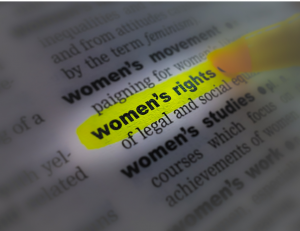 Fast forward to the present era, the concept of women’s rights and gender equality is at the forefront of inequalities that continue to inflict society.
Fast forward to the present era, the concept of women’s rights and gender equality is at the forefront of inequalities that continue to inflict society.
For many women across the globe, this phenomenon is one that is incredibly distressing and painful. In Australia, there is also an overwhelming level of injustice and abuse that is crying for attention. Every day, harrowing statistics are being generated as a result of women’s lives being lost. Women are experiencing inequalities and discrimination – simply because they are women. But, the question remains – despite so many efforts to dismantle these increasingly alarming situations, why is society still plagued with a battle between the sexes?
What’s wrong with modern-day feminism?
Amid the historical struggle of women pursuing equality within all aspects of life, metaphorical ‘waves’ of feminism have undergone different eras and generations of activism. Feminism, at its core, signifies advocacy for women on the grounds of gender equality, striving to empower women with equal rights and opportunities within social, economic, political, and ideological spheres.
At present, the current feminism wave is not a protest against unjust laws or sexism, rather it is a movement against people’s unconscious biases and historical cultural norms and heritage that have disadvantaged women. Most likely the biggest phenomena of the 21st century, the common concept of feminism is one that remains erroneous. Over the years, waves of feminism have meant different things for different people. Although it may seem that these rights fundamentally should not require any debate, millions across the world do not support these movements. This is mainly because these revolutions of activism have shaped a fight for equality that requires the modern-day feminist to compare herself to a standard set by a society whose ideals are ever-changing.
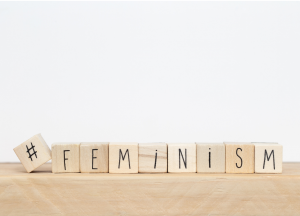 Although being a feminist may mean different things for different people, the anchor by which comparisons are made remains that of men. When it comes to the equal rights of men and women, society becomes entangled in how this equality should be achieved. Modern-day feminism expects that society compares women to men and that women should be able to achieve all that a man is able to do.
Although being a feminist may mean different things for different people, the anchor by which comparisons are made remains that of men. When it comes to the equal rights of men and women, society becomes entangled in how this equality should be achieved. Modern-day feminism expects that society compares women to men and that women should be able to achieve all that a man is able to do.
But, why should the standard of a man be the standard with which women are compared?
Patriarchal structures and misogynistic influences have been so deeply embedded in creating these standards in modern society, that even women themselves fail to understand their true value. Finding value in comparison to men, modern-day feminists provide a dismal standard that will forever remain unattainable for women.
Equality in its true sense
It is important to understand the concept of equality, which in essence is the foundation of this entire phenomenon. If feminist movements aspire towards absolute equality of the genders, the comparison between men and women will always be impossible to achieve. Being equal in each and every sense, whether it is physically, physiologically, mentally, or emotionally; there will always be differences between men and women.
But, achieving gender equality in the best sense – this is what is actually possible.
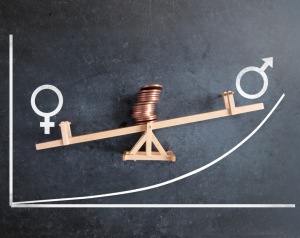 The growing belief that effective feminism must put women and men on the same pedestal for comparison, disregards the recognition of the unique roles of both women and men in society. In reality, equality that is based on the unique characteristics of men and women, by having an equitable standing in society, is a true form of equality that is common sense.
The growing belief that effective feminism must put women and men on the same pedestal for comparison, disregards the recognition of the unique roles of both women and men in society. In reality, equality that is based on the unique characteristics of men and women, by having an equitable standing in society, is a true form of equality that is common sense.
In today’s society, the construct of feminism and gender equality has emerged because God is being rapidly taken out of the picture. God has honoured both women and men, giving them value in relation to Himself, and not one another. But, women are being left with only one standard and are not being compelled to realise and achieve their own worth.
Under the guise of progress and freedom, women are being mentally enslaved by showing a false picture of liberation. Because society has become deviated from Divine design and intent, modern culture has become conflicted in its understanding of a true sense of equality between the genders.
Muslim women – oppressed, inferior and subjugated?
Concerns often raised advocate that Islam is not a religion that protects the rights of women or establishes their worth in society; rather, it is a religion that promotes sexism, misogyny, chauvinism, bigotry, and prejudice. Oppressed, inferior, and unequal – for many people, these are the first words that come to mind when thinking about Muslim women.
There is no doubt, the actions of some Muslims portray a picture of Islam where women are under the power of men who have bound their better halves under the shackles of misconstrued Islamic teachings. Many countries that claim to be Islamic states, sanction laws that leave women with practically no rights. But, these stereotypical displays confuse the teachings of Islam with patriarchal practices that have no foundation within the actual teachings of Islam.
Islam is a way of life that provides the most sophisticated of guidelines on how to live one’s life with purpose. It provides a solid understanding for women that, rather than comparing themselves to others, emulating the characteristics of something far greater – that of our Creator, is the only way to bring about a true sense of equality. Thus, the value of a woman is not determined by how similar she is to a man; rather, how similar she is to God.
 The role of Islam in establishing equality for women
The role of Islam in establishing equality for women
Few people realise that Islam has empowered women with the most progressive rights, and has done so since the 7th century. Furthermore, in order to understand how important the history of Islam is and how it has empowered women, we need to first understand the circumstances in which these rights were bestowed for women.
At this time, women were treated very poorly, and girls were often buried alive as soon as they were born. At this time, a woman’s consent concerning anything related to their well-being was considered unimportant and unnecessary. They were not consulted before having to forcibly sign marriage contracts. They were not involved in any family decisions. Mostly they had no independence, could not own property, and were not allowed to inherit. In times of war, it was common practice to exchange women as ransom for freedom.
With the advent of Prophet Muhammad (peace be upon him), God began to reveal the message of Islam. Among many other things, the teachings of Islam completely transformed mindsets regarding the treatment of women. The importance of this change is so great, that there is an entire chapter in the Holy Quran specifically about the rights and responsibilities of women.
The empowerment of women by Islam
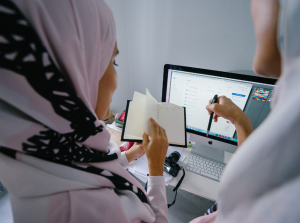 Islam is a balanced religion. Gender equality, first and foremost, is a basic human right. Islam recognises this right and emphasises that while men and women have physical differences, they enjoy absolute spiritual equality from God. God says in the Holy Quran: “But whoso does good works, whether male or female and is a believer, such shall enter Heaven.”
Islam is a balanced religion. Gender equality, first and foremost, is a basic human right. Islam recognises this right and emphasises that while men and women have physical differences, they enjoy absolute spiritual equality from God. God says in the Holy Quran: “But whoso does good works, whether male or female and is a believer, such shall enter Heaven.”
While Islam clearly establishes that men and women are equal, it does recognise that they are not identical. God created men and women with unique physiological and psychological attributes. In Islam, these differences are embraced as vital components to a healthy family and community structure with each individual contributing their own distinctive talents to society.
Gender superiority in Islam
Nowhere does the Holy Qur’an state that one gender is superior to the other.
The Holy Qur’an makes it clear that the sole basis for the superiority of any person over another is piety and righteousness, not gender, color, or nationality. It says, “O mankind! We created you from a single (pair) of a male and a female and made you into nations and tribes that you may know each other. Verily the most honored of you in the sight of Allah is (one who is) the most righteous of you.”
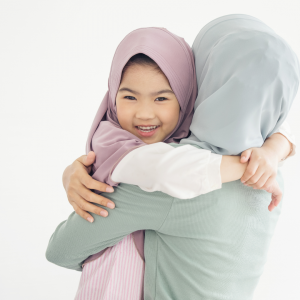 Similarly, the rights, roles, and responsibilities of women are evenly balanced with those of men but are not necessarily the same. As Islam has granted individual identities to men and women, a constant comparison between the two is futile. Each plays a unique role to mutually uphold social morality and societal balance.
Similarly, the rights, roles, and responsibilities of women are evenly balanced with those of men but are not necessarily the same. As Islam has granted individual identities to men and women, a constant comparison between the two is futile. Each plays a unique role to mutually uphold social morality and societal balance.
This designation of roles and distribution of responsibilities is sometimes confused with the provision of fundamental human rights for women. God says in the Holy Quran, that women must be ensured rights similar to men; even if it is something as basic as food, clothing, or shelter. Because one gender is better equipped than the other in certain circumstances, does not mean that the other gender is in any way inferior.
These inherent human rights for men and women are foundationally unique. A simple example being the rights of a woman to be cared for in her role of becoming a mother. No man can ever truly experience the discomforts of pregnancy, or endure the pain of childbirth, or fulfill the role of a mother throughout the lifetime of the child. And therefore, a man can never claim to require these rights owed towards a woman during parenthood.
Perhaps the most important method of empowerment that Islam has given to women is that she has the freedom to own her personality. There is certainly no better form of empowerment than to be your own self!
Islam ensures that a woman has the choice to live a life of her own and that she is not deficient from a man in any way. In God’s eyes, he has provided equality between men and women and both are accountable for their own deeds and actions. Islam allows a Muslim woman to have confidence, security, and self-esteem.
Empowerment through modesty
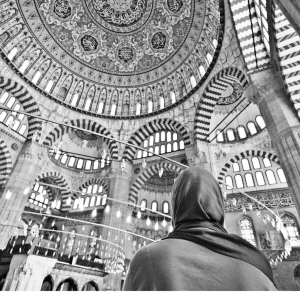 In our current environment where the physical form of women is constantly scrutinised, Muslim women are liberated from such objectification when they practice modesty. The stereotypical notion that modesty means oppression, is far from the truth, and as such, Islam highlights that a woman is much more than how she looks, that a woman’s personality and character are more important.
In our current environment where the physical form of women is constantly scrutinised, Muslim women are liberated from such objectification when they practice modesty. The stereotypical notion that modesty means oppression, is far from the truth, and as such, Islam highlights that a woman is much more than how she looks, that a woman’s personality and character are more important.
The injunction for Muslim women to veil themselves provides an essential mechanism from which she is protected from the harsh evil that exists within society. In this regard, Islam does not require any individual to force or punish women to veil themselves. Like all aspects of faith, a Muslim woman is empowered to make the decision to be modest for herself.
For Muslim women, the choice to lead a modest life is not an imposition, rather it is an act of love. Love for God, when she chooses to enact this injunction for her own betterment. And, love for His creation, when she chooses to veil her beauty and vulnerability for the betterment of society. This understanding develops a deep level of integrity and courage for Muslim women, where she develops morality based on values that are intrinsically beneficial for mankind as a whole.
Empowerment through education
 When we talk about women’s empowerment through education, history tells us that back in the 7th century, Prophet Muhammad (peace be upon him) declared that the pursuit of knowledge is obligatory on every Muslim – male and female. This declaration was very clear and was largely implemented by Muslims throughout history.
When we talk about women’s empowerment through education, history tells us that back in the 7th century, Prophet Muhammad (peace be upon him) declared that the pursuit of knowledge is obligatory on every Muslim – male and female. This declaration was very clear and was largely implemented by Muslims throughout history.
One of the most influential scholars of Islam was Prophet Muhammad’s wife, Hazrat Aisha (May God be pleased with her). She learned so much and had a wonderful memory that the Prophet told his companions that they could take half of their knowledge of Islam from Hazrat Aisha. After his death, men and women would travel to learn from her because she was considered a great scholar of Islam. By this appointment of a woman in this exalted position, the Prophet was elevating women to the highest and perhaps the most prestigious position of power, for knowledge is indeed the greatest source of power.
The recognition of female scholarship and women’s participation in academia has been encouraged and practiced throughout the majority of Islamic history. For instance, the al-Qarawiyin Mosque and University, the oldest running university, was founded by a woman, Fatima al-Fihri, in Morocco in 859 C.E.
Empowerment through economic freedom
Empowerment through economic freedom is also something that Islam has laid the foundation for. A lot of what is called economic empowerment in the current era was prescribed by Islam 14 centuries ago. Muslim women are not obliged to earn or spend money to look after their families. If she is married this is the responsibility of her husband, and if she is not married it is the responsibility of her closest male relative, such as her father or her brother.
 In addition, she also has the right to work and spend her own earned money as she pleases. If she chooses to spend it on her family, it will only be through her goodwill. An excellent example from 14 centuries ago is that of Hazrat Khadija, the wife of Prophet Muhammad peace be upon him, she was one of the most successful businesswomen of Mecca, and she freely spent from her wealth to support her family.
In addition, she also has the right to work and spend her own earned money as she pleases. If she chooses to spend it on her family, it will only be through her goodwill. An excellent example from 14 centuries ago is that of Hazrat Khadija, the wife of Prophet Muhammad peace be upon him, she was one of the most successful businesswomen of Mecca, and she freely spent from her wealth to support her family.
Similarly, before Islam, women all across the globe were deprived of inheritance and were themselves considered property to be inherited by men. Islam gave women the right to own property and inherit from relatives, which was a revolutionary concept in the seventh century. Whether a woman is a wife, mother, sister, or daughter, she also receives a certain share of her deceased relative’s property. While many societies around the world denied women inheritance, Islam assured women this right, illustrating its universal system of justice.
Empowerment through marriage
Another common misconception about the rights of women in Islam is that of marriage. In Islam, a woman has the right to accept or reject marriage proposals and her approval is required to complete the marriage contract. She cannot be forced to marry someone against her will and if this occurs for cultural reasons, it is in direct opposition to Islam. By the same principle, women also have the right to seek divorce if they are not satisfied with their marriage.
In Islam, marriage is based on mutual peace, love, and compassion. Many instances of this are described in the Holy Quran and through the teachings of Prophet Muhammad (peace be upon him) who embodied the best character towards his wives. His example of being helpful around the household and treating his family with compassion and love is a tradition that Muslims strive to implement in their daily lives. Prophet Muhammad (peace be upon him) treated his wives with the utmost respect and honor and was never abusive towards them. One of his traditions clearly states, “The best of you are those who are best to their wives.”
Empowerment through her role as a woman
Women play essential roles in the formation of society. The many roles which a woman may play throughout her life in her capacity as a daughter, wife, mother, and friend, must take into account the fact that far from being the passive, oppressed, victim of popular stereotype, woman and for that matter, the Muslim Woman is seen to be a whole person with a valid contribution to make at every level of life.
In the role of a daughter, Muslim women have been granted an esteemed rank. A father must raise his daughters in the same way as he does his sons, and taking care of daughters in a dignified manner enables a father to achieve the ranks of paradise.
 In the role of a mother, a woman achieves something that is completely out of the reach of man, something impossible for him to accomplish. According to the Prophet of Islam, heaven lies at the feet of the mother. In another narration, the Holy Prophet emphasised three times to a companion the supremacy of a mother over a father.
In the role of a mother, a woman achieves something that is completely out of the reach of man, something impossible for him to accomplish. According to the Prophet of Islam, heaven lies at the feet of the mother. In another narration, the Holy Prophet emphasised three times to a companion the supremacy of a mother over a father.
In the role of a wife, Islam changed the position of women from being little more than a servant to being an equal partner in the bond of marriage. The Holy Quran makes it clear that when it comes to marriage, both women and men have rights and responsibilities. Both the husband and wife are responsible for sustaining a harmonious relationship that is built upon, support, protection, and comfort with one another. Islam goes one step further where it specifically instructs men to treat their wives with compassion and kindness.
Empowered through faith
No matter how hard we scrutinise other religions, the level of empowerment that a Muslim woman achieves through her faith in Islam is undeniable. In certain ways, Muslim women enjoy privileges not even granted to men. Specifically addressing their needs and esteemed position in society, Islam defines the role of a Muslim woman based on a sense of absolute equality and justice.

 The role of Islam in establishing equality for women
The role of Islam in establishing equality for women